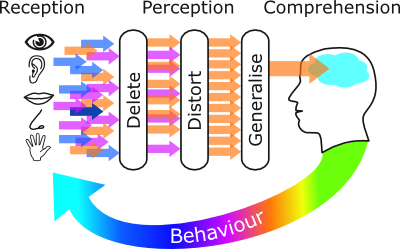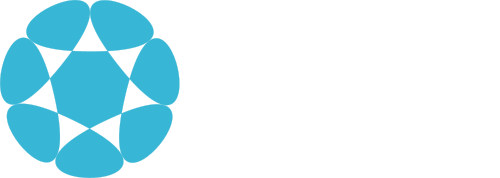Just in case you've arrived here out of pure curiosity and you don't yet know what NLP is, allow me to explain.
NLP, short for Neuro Linguistic Programming, is a study of the relationship between our mind, our language and our habitual patterns of behaviour.
One of the central concepts in NLP is that we do not interact directly with the outside world; we interact with a summary or generalisation of it. You may not believe that, you may believe that there is only objective reality and that's that. However, if there is only one objective reality, how can two people have such different memories of the same event? How is that you aren't aware of the feeling of your feet until I draw your attention to it?
We each see the world from our own, subjective point of view. Since there is far too much information for us to pay attention to, our process of perception simplifies and reduces the world, so that when you get back to work after a weekend break and your colleagues ask you how your weekend was, you can summarise 48 hours of exciting activities into, "great, thanks".

The difficulties that people often face in life can easily arise from this simplification process. Consider someone who, as a child, was scared by a dog. Which is more logical, from a survival point of view - checking each dog individually to see if it poses a threat, or considering all dogs to be dangerous, just to play it safe? If you have children, you have probably taught them that all roads are dangerous, and with good reason. It's likely enough that it's as good as true.
These beliefs become ingrained over the course of our lives, so that we no longer question them or are even aware of them.
The problem is this: roads are not dangerous. The danger comes from standing in the middle of the road while someone else drives a car towards you.
A road is not under your control, so knowing roads to be dangerous doesn't help you, because all you can do to save yourself is to avoid roads. Unfortunately, you can't even cross the street without encountering a road, so you're stuck in a dilemma that faces almost everyone in different situations, throughout their lives, where a universal rule no longer fits 'reality'.
Making a decision to stand in the middle of a busy road is under your control. You can make an informed choice about the risk involved, and take steps to minimise that risk. Simply, this means that you have learned to function normally within society, by adapting your rules to the reality of the current situation.
At the first 'Practitioner' level of NLP training, NLP is a collection of tools that essentially enable you to update these latent operating rules so that you can let go of beliefs that no longer serve you and adapt to an exciting and ever changing world.
At the second 'Master Practitioner' level of NLP training, NLP is the toolkit that allows you to create your own techniques, completely customised to each person you work with. This toolkit also enables you to 'model excellence' - replicating the thought processes and behaviours of anyone who you recognise as having a talent for a particular activity or result.
